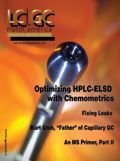Pittcon Announces ACS–DAC Coprogramming
Pittcon (Pittsburgh, Pennsylvania) announced that twelve sessions at Pittcon 2009 at McCormick Place South in Chicage, March 8-13, will be coprogrammed with the ACS Division of Analytical Chemistry (ACS-DAC).
Pittcon (Pittsburgh, Pennsylvania) announced that twelve sessions at Pittcon 2009 at McCormick Place South in Chicago, March 8–13, will be coprogrammed with the ACS Division of Analytical Chemistry (ACS-DAC). The planned sessions include invited symposia, organized contributions, and a poster session. Topics will include the biological applications of capillary electrophoresis, the evolution of modern chromatography, HPLC method robustness, multidimensional separations, pressurized fluids in separations technology, a young investigator award, validation of bioanalytical methods, electrochemical sensors, pesticide analysis, sub-2-μm particles and chromatography, and quality assurance.

Characterizing Plant Polysaccharides Using Size-Exclusion Chromatography
April 4th 2025With green chemistry becoming more standardized, Leena Pitkänen of Aalto University analyzed how useful size-exclusion chromatography (SEC) and asymmetric flow field-flow fractionation (AF4) could be in characterizing plant polysaccharides.
Investigating the Protective Effects of Frankincense Oil on Wound Healing with GC–MS
April 2nd 2025Frankincense essential oil is known for its anti-inflammatory, antioxidant, and therapeutic properties. A recent study investigated the protective effects of the oil in an excision wound model in rats, focusing on oxidative stress reduction, inflammatory cytokine modulation, and caspase-3 regulation; chemical composition of the oil was analyzed using gas chromatography–mass spectrometry (GC–MS).










